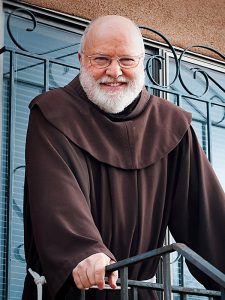
“Christianity was meant to provide wholeness, to know we are going somewhere good and coming from somewhere good,” said Fr. Richard Rohr, OFM, at the 9:15 a.m. Tuesday Ecumenical Service in the Amphitheater.
His sermon title was “A Chinese Doll,” and the Scripture text was 1 John 1:1-4.
“John seems to be saying the beginning already revealed the end, and in the end we will see what the beginning was pointing toward,” Rohr said.
The postmodern world does not believe there is a great, overarching story.
“Postmodernism believes that all stories are just anecdotal and incoherent,” he said. “We are considered old-fashioned if we talk about a great story. We have seen where that incoherence has led in politics.”
Genesis begins with matter and spirit becoming one.
“It was good, and then there came a very fast series of: good, good, good, good and very good. What happened to that goodness?” Rohr asked.
The church, he said, contributed to the postmodern incoherence by beginning the story of the world with Genesis 3, original sin, instead of Genesis 1, what American theologian Matthew Fox called original blessing.
By starting with Genesis 3, “we started with a problem and never got beyond problem-solving,” Rohr said.
Rohr cited St. Athanasius, called the “father of orthodoxy.” Athanasius said that God consistently worked through one man to reveal God’s self everywhere.
“Nothing is devoid of God’s knowledge,” Rohr said. “Each part of creation has a piece of the consciousness of God.”
Rohr then told the congregation: “We waited for the written words and did not take to the created words. My book, The Universal Christ, is a footnote to Athanasius. This is the oldest teaching, not the newest.”
When Christianity became the official religion of the Roman Empire in 313 C.E., it aligned its theology with the empire.
“We forgot about the Sermon on the Mount and the Beatitudes,” Rohr said.
Then, in 1054 C.E., the Patriarch of Rome and the Patriarch of Constantinople mutually excommunicated each other.
“That was the beginning of ecumenism,” Rohr said. “Afterward we never had one, holy church.”
Protestants only reformed the Western half of the church.
“The Eastern church held the universality of the church, and now there is no longer a wholeness to the universal story,” Rohr said. “Jesus never said, ‘thou shalt be right,’ but we sure do try.”
In Genesis 1:26-27, God says “let us create in our image.”
“There are two plural pronouns here and that is a problem for monotheists,” Rohr said. “That is why we have the trinity; God is connection and communion.”
However, our image of God is pretty pagan, according to Rohr.
“He is an old white man sitting on a throne throwing lightning bolts,” he said. “The Latin word deos is a transliteration of the Greek Zeus. If we have a punishing, problem-solving God, we don’t know how to love a unifying God. If God is the primary torturer, violence is legitimated all the way down the line. This is why we are not known as a peace-making church; this is the thinking of teenagers. I think we grow spiritually one year every century in comprehending the Christ mystery. The Reformation happened when we were about 16. Today we are young adults and are just ready for the cosmic Christ.”
Genesis 1:26-27 also talks about the image and likeness of God. Franciscans, Rohr told the congregation, came to understand image as the universality given equally to all creatures from the mind of God, and we should learn to draw on it.
Likeness is the subjective appropriation of the objective image.
“Some of us are more like the objective image than others, but as Jesus said, ‘all have fallen short of the glory of God,’ ” Rohr said.
The image of God, the imago dei, is within you, Rohr told the congregation. For Catholics, the imago dei was found in the sacraments; for Protestants, the imago dei was in moral behavior.
“Then the fight became who was moral enough,” he said.
The feast day of St. Bonaventure was Monday. After a lifetime of reading, Bonaventure distilled all he learned into three statements: Everything emanates from God, everything exemplifies God, and the consummation of life is the ascension of Christ.
“We came from God, we play on life’s stage and then we go back to God,” Rohr said. “In the beginning was the end, and at the end we will know where the beginning was pointing.”
The Rev. Paul Womack presided. Audrey Williamson, a scholarship student with the International Order of the King’s Daughters and Sons, read the Scriptures. She is from Brookhaven, Mississippi, and attends Mississippi State University, studying communications. For the prelude George Wolfe, saxophone, and Joseph Musser, piano, played “Largo” from “A Tribute to Sax” by Alain Crepin, a tribute to Adolphe Sax, who invented the saxophone. The Motet Choir sang “The Prayers I Make,” by Jane M. Marshall under the direction of Jared Jacobsen, organist and coordinator of worship and sacred music. The Alison and Craig Marthinsen Endowment for the Department of Religion provides support for this week’s services.




